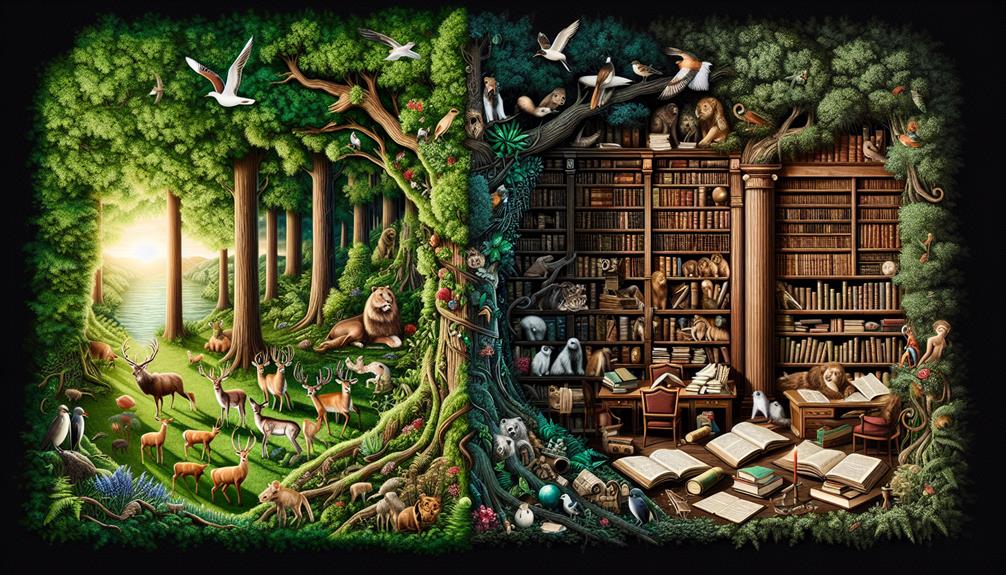You’ve likely come across the nature versus nurture debate at some point, but it’s time to recognize that the discussion unfolding in scholarly articles is far from a mere controversy. It’s an evolving debate where the lines between inherited traits and environmental factors blur, creating a rich tapestry of insights into human development. Scholars don’t just pick sides; they explore how these elements interact in multifaceted ways, challenging the simplicity of traditional viewpoints. Consider how this ongoing synthesis could reshape your understanding of human behavior and the potential implications for future research. What might you discover if you look beyond the surface?
Nature vs Nurture Debate
The nature vs nurture debate has captivated scholars and the public alike, probing the intricate balance between genetic and environmental influences on human behavior and development. This ongoing dialogue delves into how these forces shape personality, intelligence, and even emotional health, making it a cornerstone of psychology, sociology, and biology.
Understanding this debate requires a historical lens, illustrating how perceptions of these influences have evolved dramatically over centuries, reflecting shifts in scientific understanding and cultural attitudes. Empirical studies increasingly underscore the importance of both genetic predispositions and environmental contexts, highlighting a complex interplay that cannot be easily disentangled.
To illustrate the relevance of this debate in contemporary society, consider the growing body of research on the impact of childhood adversity on adult mental health. According to the CDC, nearly 60% of adults report experiencing at least one adverse childhood experience (ACE), which can significantly increase the risk of mental health issues, emphasizing the substantial role of nurture in shaping outcomes.
Historical Context of the Debate
The nature vs nurture debate has its roots in philosophical discussions dating back to ancient Greece. Plato posited that innate qualities govern human behavior, while Aristotle countered that environment and experience are paramount in shaping individuals. These foundational ideas set the stage for centuries of inquiry.
Fast forward to the 19th century, where Charles Darwin’s theory of evolution introduced a biological dimension to the debate. Darwin emphasized natural selection, suggesting that genetic traits aiding survival would be passed down through generations. This idea was pivotal, prompting a deeper investigation into hereditary influences, which gained momentum with the advent of genetics in the 20th century.
In recent years, the dialogue has evolved to embrace a more integrated perspective, supported by advances in technology such as genome mapping. A landmark study published in Nature Genetics in 2015 used data from over 1.1 million individuals to demonstrate that both genetics and environment significantly impact traits like intelligence and personality.
Origins and Evolution of the Nature vs Nurture Argument
The question of how the nature vs nurture debate originated is as fascinating as it is complex. Initially framed by ancient philosophers, the argument took on new dimensions with the rise of modern science. In the early 20th century, behaviorism, championed by figures like John Watson and B.F. Skinner, posited that all behavior is learned through interaction with the environment, downplaying genetic factors.
However, the latter half of the century saw a resurgence of interest in genetics, particularly following the discovery of DNA’s structure in 1953. Contemporary research now recognizes the interaction between genes and environment as critical to understanding human behavior, a perspective supported by findings from studies such as the Minnesota Twin Study, which emphasizes the role of both inheritance and upbringing.
Key Concepts in the Nature vs Nurture Discussion
To navigate the nature vs nurture debate effectively, it is crucial to define key terms. ‘Nature’ refers to genetic or hereditary influences—traits and behaviors that are biologically determined and can be influenced by genetic variation. Conversely, ‘nurture’ encompasses all environmental factors that impact development, including family dynamics, education, and social interactions.
Comprehensive studies, like those conducted by the National Institute of Health, reveal that both nature and nurture significantly shape individual differences. For instance, a study analyzing the effects of parental involvement found that children with engaged parents exhibited higher academic performance, demonstrating the powerful influence of nurturing environments.
Defining Nature and Nurture in Academic Discourse
In academic discourse, defining ‘nature’ as the genetic or hereditary influences on human behavior is essential to understanding the biological underpinnings of personality and traits. On the other hand, ‘nurture’ represents the environmental factors that shape behavior and development, ranging from parenting styles to cultural contexts.
While these definitions provide a framework for analysis, the reality is that the interactions between genetic and environmental factors are often complex and interwoven, challenging simplistic categorizations. As highlighted by Dr. Robert Plomin, a leading researcher in behavioral genetics, “Our genes interact with our environment in ways that are often unpredictable but profoundly impactful. The future of this debate lies in understanding these interactions rather than pitting nature against nurture in isolation.”
Scholarly Articles on Nature vs Nurture
You’ll find that scholarly articles on the nature versus nurture debate often illuminate how genetic predispositions and environmental factors intertwine to shape human behavior. These studies not only broaden the understanding within academic communities but also influence ongoing research and policy-making.
It’s important to recognize the diversity of perspectives and methodologies employed in these articles to appreciate the complexity of the debate fully.
Analysis of Nature vs Nurture Journal Articles
As you examine the comparative studies on the nature versus nurture debate, you’ll find that scholarly articles often present a spectrum of perspectives.
These works typically weigh genetic predispositions against environmental influences, offering insights supported by empirical data.
It’s important to assess the methodologies used in these studies to understand their conclusions and the robustness of their findings.
Comparative Study of Scholarly Works on the Debate
Numerous scholarly articles have systematically examined the nature versus nurture debate, revealing diverse perspectives and methodologies in their approach to understanding human behavior.
You’ll find that studies often tilt towards an integrative view, suggesting a dynamic interplay between genes and environment.
Impact of Nature vs Nurture Research in Scholarly Communities
Research into the nature versus nurture debate profoundly shapes scholarly communities by influencing theoretical frameworks and methodologies across various disciplines. This debate isn’t just academic; it permeates research approaches, guiding how scholars design studies and interpret data.
In psychology, for instance, understanding the balance between genetic predispositions and environmental factors can determine approaches to mental health treatments. Similarly, in education, insights from this research influence strategies that cater to the innate abilities or the learned experiences of students.
Furthermore, the debate challenges and enriches scholarly discourse by promoting interdisciplinary collaboration. Geneticists, psychologists, sociologists, and educators often come together to explore complex questions about human behavior, leading to more detailed and holistic approaches to research. This synergy not only broadens the scope but also deepens the impact of findings within the academic community.
As you dive deeper, you’ll see that ongoing discussions around nature versus nurture have spurred significant methodological innovations. For example, the rise of epigenetics has blurred the lines between inherited and acquired traits, pushing scholars to refine their research models.
This dynamic field continually prompts you to question and expand your understanding of human development, ensuring that scholarly exploration remains vibrant and critically engaged.
Contemporary Perspectives on the Debate
As you explore contemporary perspectives on the nature vs nurture debate, you’ll find that modern research increasingly supports a more integrated approach, acknowledging that both genetic and environmental factors are intricate and interdependent.
Critics, however, point out that this paradigm can sometimes oversimplify the complex interplay of genes and experiences.
Scholarly discussions emphasize the need for nuanced methodologies that can disentangle and quantify the specific contributions of nature and nurture.
Integration of Nature and Nurture in Modern Research
As you explore the integration of nature and nurture in modern research, you’ll find that scholars increasingly reject the dichotomy, favoring a more holistic approach.
Recent studies illustrate how genetic predispositions interact with environmental factors to shape behavior, indicating a complex interplay rather than isolated influences.
This shift emphasizes the importance of examining both biological and experiential factors to fully understand human development.
Emerging Trends in Resolving the Dichotomy
Scholars are increasingly recognizing that the integration of genetic predispositions and environmental influences offers a more thorough understanding of human behavior.
You’re seeing a shift towards models that blend these elements to predict outcomes more accurately.
This approach acknowledges complexity and avoids oversimplification, providing a nuanced view that respects the contributions of both genes and environment in shaping individual differences.
Challenges and Critiques of the Nature vs Nurture Paradigm
Recent critiques challenge the traditional nature vs nurture paradigm, highlighting its oversimplification of complex human traits. You’re confronted with a model that perhaps too neatly categorizes attributes into either genetic or environmental factors, ignoring the interplay that truly shapes behavior and abilities.
Scholars argue that the interaction between genes and the environment is dynamic, not static, which means your traits aren’t just handed down or taught; they’re constantly developing in response to ongoing changes in both your genetic make-up and environmental conditions.
Critics also emphasize the need for a more nuanced approach that considers epigenetics—the way in which gene expressions are influenced by external factors. This perspective underscores that you aren’t simply the sum of pre-programmed genetics or isolated experiences.
For example, research shows that trauma can affect gene expression and consequently impact behavior across generations, suggesting that the lines between inherited and acquired traits are far blurrier than previously thought.
Moreover, there’s a call within the scholarly community to move beyond the dichotomy altogether, advocating for a framework that better accommodates the complexities of human development. This shift is important as it opens up more thorough strategies for addressing issues like mental health, education, and social inequality.
Future Directions and Implications
As you contemplate the future directions of the nature versus nurture debate, it’s essential to evaluate how emerging frameworks could transform interdisciplinary approaches, from psychology to genetics.
You’ll find that incorporating robust, data-driven models can potentially harmonize these often polarized views, providing a more integrated understanding of human development.
Implications of Nature vs Nurture Debate for Various Fields
You’ll find that the nature vs nurture debate has significant implications across several scholarly fields, influencing current research and future directions.
In psychology, understanding the balance between genetic predispositions and environmental influences can refine therapeutic approaches.
Similarly, in biology and sociology, this debate shapes theories about genetic determinism and social behaviors, impacting everything from policy-making to educational frameworks.
Applications in Psychology, Biology, and Sociology
Understanding the implications of the nature versus nurture debate is essential for advancements in psychology, biology, and sociology.
You can see how genetic predispositions interact with environmental stimuli to shape behaviors and traits.
This understanding helps develop targeted therapies in psychology, personalized medicine in biology, and enhanced social policies in sociology.
Each field uses this knowledge to refine theories and improve practical applications.
Proposed Frameworks for Advancing the Debate
To advance the nature versus nurture debate, scholars propose integrating interdisciplinary frameworks that encompass genetic, environmental, and psychological factors.
You might wonder how these frameworks can reshape our understanding. By acknowledging the complexity of human development, these models offer a more nuanced perspective than traditional views. This approach doesn’t just add layers of knowledge; it fundamentally changes how we perceive ourselves and others.
Here are three key elements of the proposed frameworks that are designed to evoke a deeper emotional connection and understanding:
- Holistic Insight: Acknowledging that no single factor can dictate who you become. This realization can be liberating and empowering, as it highlights the multifaceted nature of human development.
- Shared Responsibility: Emphasizing environmental and societal impacts on behavior fosters a sense of collective responsibility for fostering healthier communities. It’s not just about individual predispositions but how we as a society contribute to each individual’s growth.
- Personal Empowerment: By understanding the diverse influences on behavior, you gain the power to change your own life trajectory. It’s inspiring to think that your choices and environment play essential roles in shaping who you are.
These frameworks don’t just enrich the academic discussion; they empower you to view human behavior through a broader, more compassionate lens.




